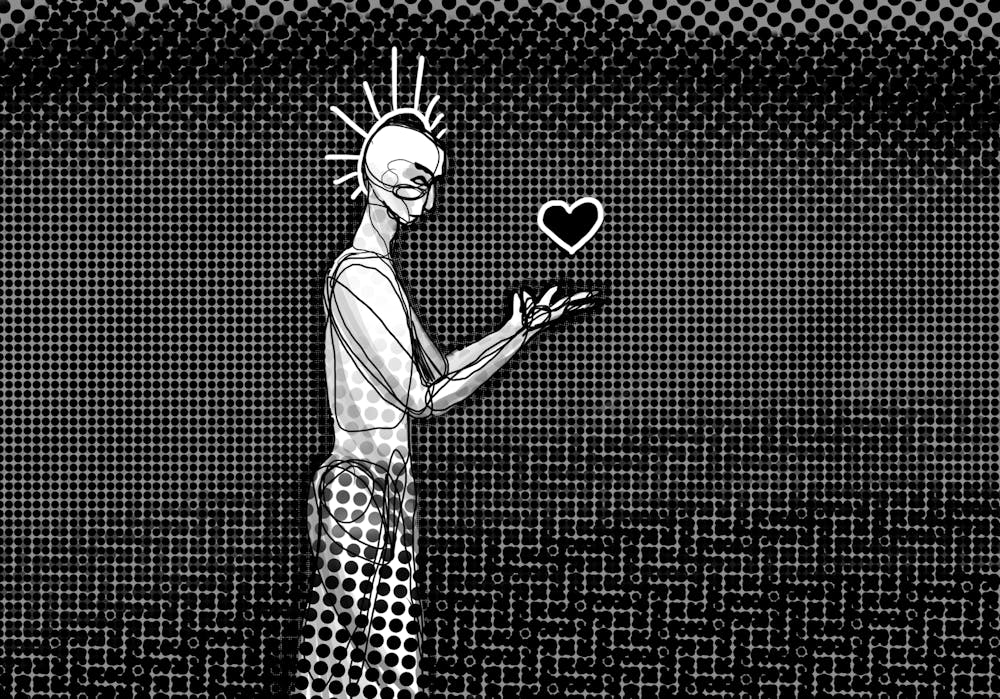There are not many things in this world that I, with time, cannot overcome. If it’s a homework assignment, I can escape the all-consuming mindset that one assignment will affect the trajectory of my career. If it’s a disagreement among friends, I can find ways to view multiple perspectives, finding a fitting solution for us all. And yet, through and through, when it comes to love and navigating those larger-than-life feelings, instantly, my throat chokes up, my tear ducts fill, and I find my self-worth in the hands of others.
I didn’t always feel like this—longing for something just beyond my wavering grasp. Over time, I had become familiar with feeling undeserving of love. I came to expect that the ache that returned when I watched other family members, friends, or even strangers exchange affection and wondered whether this love was earned or freely given. There was a crushing place in my heart where I questioned whether good things did not always come to good people.
I grew up in a household where my self-worth was often determined by my ability to be better than others academically. This led to an intense power struggle between myself and my parents: trying to prove to them that I could score higher on an exam than my brother while they berated me for not being as naturally smart as them.
The vibrant and bubbly child I once was curdled into an introverted and quiet being, never stepping beyond the shadows of my brother and parents’ dictations of me. Endless tears, along with wobbly moments on the emotional edge, led me to ponder the purpose that I would serve in the future and whether I was worthy of the affection they dangled in front of me.
Standing in the mirror, I told the 13-year-old trembling and cowering under crippling stress, that I was inevitably stuck in this game. This is what love feels like and I cannot win.
Around the same time, different, yet parallel feelings enveloped me—the desire to be wanted. The times I have come the closest to feeling love were during 6th grade and my senior year of high school. The two people that I pined for had qualities that I deeply wanted : they were confident, smart, warm, and patient. I believed that if I tried hard enough and proved that I could be compatible with them, I could manifest not only their love, but their worthy qualities.
Nights of dwelling led to no avail. I began to fantasize about them in my head, creating scenarios in which we would gently hold hands in class, or study together in the back corridor of the library. There always came a point in my thoughts when guilt overcame any previous feelings of reassurance.
Who was I to be loved, when I did not even love myself?
In my current months of reflection and healing, the truest sentiment has often been the most painful: we accept the love we think we deserve. Why is it that we let the attention of others influence us so heavily? Do we need love to live and for our lives to fully flourish? What does it mean to give and receive love?
How do I begin to answer these questions?
I realize how deeply I wanted to be loved and to the extent to which I loved others. The inner child I carry with me, the one that pines for some notion that I am not alone, knows the history of my family. My mother’s love language is not words of affirmation, but is instead shown through actions—cooking me my favorite meals, leaving out face masks and hot tea—and I recognize her effort to make me feel whole in my belonging. My father and I share a common love language of words of affirmation, and I often find artfully folded-up Post-it notes stuck on the handle of the refrigerator or posted on my bathroom mirror. Inside these messages are cheesy clippings of daily jokes he deep-dives for, or sweet words that make me feel as if my hard work does not go unnoticed. I thank him for his perseverance to help me find simple joy again.
As I reject the versions of people I thought I had loved, I trust and see now that affection exists in many forms. I surround myself with those that complement my flaws, teaching me to be considerate and optimistic.
Even now, when seeing those that find love with ease, those worries, so deeply conditioned inside of me, resurface. Seeing couples holding hands on frigid cold nights, their flowy shadows and beautiful laughs enlarged under street lamps, or watching people exchange wholesome phone calls home to their long-distance friends and lovers, updating them on the little changes in their lives, seems to leave a permanent and unfixable hole.
I hope, over time, I can experience the kind of love that feels like sliding on soft mittens during winter nightfall, or feeling the first drops of hot tea settling gently in the bottom of your stomach. I hope that over time, those overbearing feelings of wistfulness will blossom into tenderness and warmth for someone special.
I accept the love that I deserve and nothing less.



